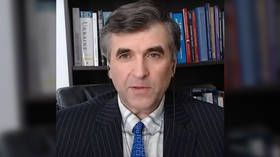Washington ‘doesn’t want to stop Israel’ – Lavrov to RT
The US does not want to constrain Israel’s military actions against the Palestinian armed group Hamas in Gaza, Russian Foreign Minister Sergey Lavrov said in an exclusive interview to RT on Wednesday.
When asked to comment on why he believed the US vetoed Russia’s resolutions in the UN seeking to stop the hostilities in the Palestinian enclave, Lavrov suggested that Washington “is highly ideologized.”
“Anything coming from Russia is taken as a hostile act… But on substance, and on practical terms Washington does not want to tie Israel’s hands,” he said.
Lavrov pointed out that such an approach works with West Jerusalem, adding that the US tried to persuade Israel to be “a little flexible” on supplies of humanitarian assistance to hospitals in the besieged enclave, as well as on letting foreigners out.
But the key reason, I believe, is that Washington does not want to stop [them] the way Israel does not like.
The first Russian-sponsored resolution on the Middle Eastern crisis, which erupted when Hamas launched a surprise attack on Israel on October 7, called for an immediate ceasefire and condemned all acts of terrorism. However, the document, which was proposed about one week after the hostilities began, was blocked by the US, UK, France – permanent members of UN Security Council – and Japan.
Later the same month, Moscow floated another iteration of the resolution that repeated the calls for a sustainable humanitarian ceasefire and the creation of humanitarian corridors but also incorporated some points from the US-sponsored document. Still, Washington, along with London, vetoed the initiative.
After the start of hostilities, many Western media outlets reported that the US was trying to persuade Israel to delay its ground operation in Gaza to allow more time for hostage negotiations. However, Israel proceeded with the incursion into the enclave in late October, while most of the more than 240 hostages are still being held by Hamas.
Last week, Axios reported that under pressure from Washington, Israel agreed to begin “tactical, localized humanitarian pauses” as the US made it clear that the request was not intended to force the Israelis into a ceasefire.












